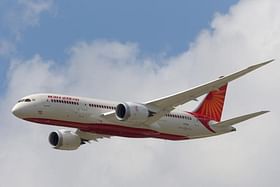Over the past month it was seen that the spot airfares for five out of India’s six busiest routes have experienced a significant increase, reaching up to three times their previous prices.
Data collected by aviation regulator DGCA’s tariff cell, revealed that ticket prices for flights scheduled a week later reduced between 13 to 56 per cent, compared to the fares on 5 June, after the minister’s intervention
Officials cited multiple reasons for the increase in air fare, which includes the demand and supply gap, seasonal fluctuations, and not because of predatory pricing
According to data provided by the government, air fares on peak routes decreased considerably this week.
Recent analysis over the past month showed that the spot airfares for five out of India’s six busiest routes have experienced a significant increase, reaching up to three times their previous prices.
Following a meeting with top bosses of airlines, civil aviation minister Jyotiraditya Scindia urged them to “self-monitor” fares on routes that experienced a considerable surge recently.
This move aimed to ensure that airline companies remain customer-friendly and do not increase fares excessively.
An official of the Ministry of Civil Aviation, citing data collected by aviation regulator DGCA’s tariff cell, revealed that ticket prices for flights scheduled a week later reduced between 13 to 56 per cent, compared to the fares on 5 June, after the minister’s intervention.
Amidst complaints of high air fare, the government ruled out capping fares, as it feels that such a move will distort competition and hurt the benefit that competition provides, reports Economic Times.
As per current regulations, airfares in India are not regulated by the Government. With the repeal of Air Corporations Act in March 1994, Indian domestic aviation was totally deregulated.
DGCA has not been empowered with the economic regulation of civil aviation and air transport, as per ET report.
“The direct impact of deregulation is that a passenger in a lower income group has been able to travel by air due to competition among airlines,” the official of the Ministry of Civil Aviation said.
Officials cited multiple reasons for the increase in air fare, which includes the demand and supply gap, seasonal fluctuations, and not because of predatory pricing.
The slowdown in aircraft deliveries caused by a global supply chain constraint has led to a situation where passenger demand exceeds supply, causing a significant increase in air fares.
Furthermore, the closure of Go First since 3 May has exacerbated the supply-demand imbalance in specific sectors where the airline had a strong presence.
“India has a highly seasonal market. Traffic is usually high in the months of May and June. July through September is traditionally a leaner period as travel is restricted due to the monsoon. In October, with the festival season, traffic picks up again and by middle of January the demand diminishes”, the official said.


